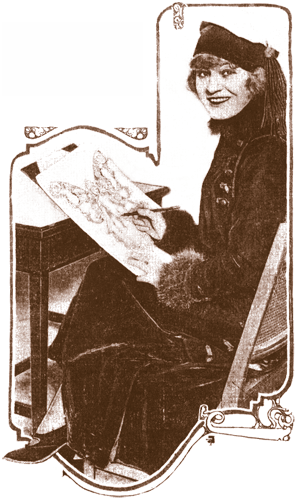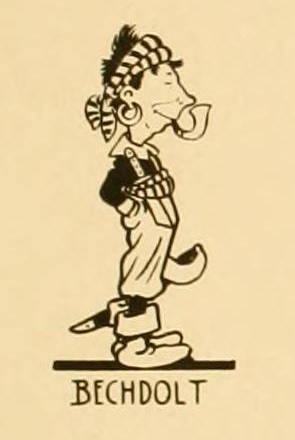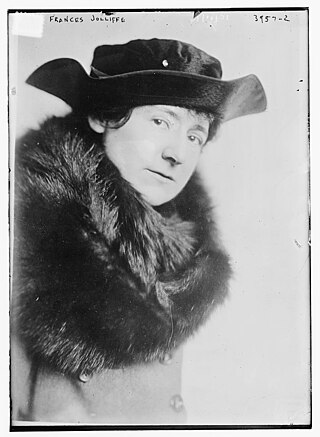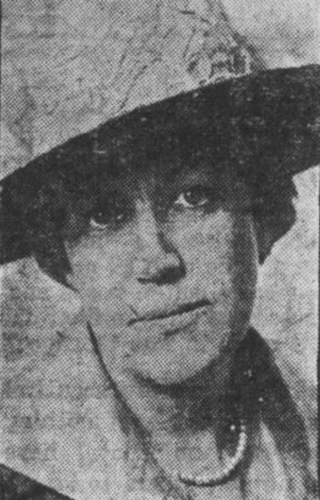
Reuben Garrett Lucius Goldberg, known best as Rube Goldberg, was an American cartoonist, sculptor, author, engineer, and inventor.

Joseph Jacinto Mora was a Uruguayan-born American cowboy, photographer, artist, cartoonist, illustrator, painter, muralist, sculptor, and historian who lived with the Hopi and wrote about his experiences in California. He has been called the "Renaissance Man of the West".
Cornelia Baxter Barns was an American feminist, socialist, and political cartoonist.

James Marie Hopper was an American writer and novelist. He was also an early college football player and coach, playing at the University of California, Berkeley in the late 1890s and then serving single seasons as head football coach at Nevada State University—now known as the University of Nevada, Reno—in 1900 and at his alma mater, California, in 1904. During his lifetime, Hopper published 450 short stories and six novels.

Nell Brinkley was an American illustrator and comic artist who was sometimes referred to as the "Queen of Comics" during her nearly four-decade career working with New York newspapers and magazines. She was the creator of the Brinkley Girl, a stylish character who appeared in her comics and became a popular symbol in songs, films and theater.

John Ernest Bechdolt was an American short story writer, novelist, and journalist. He wrote under the name Jack Bechdolt as well as his full name. He worked for the Seattle Post-Intelligencer from 1909 to 1916, after which he moved to New York City, where he worked for Munsey Publications for a year before freelancing. His first novel, The Torch, was serialized in the magazine Argosy in 1920. Several of his stories were adapted into films.

Marion Janet Harron was an American lawyer and United States Tax Court judge from 1936 to 1970. She is also known for her five-year affair with Lorena Hickok. Harron was a frequent visitor at the White House during the 1940s.

Nina Evans Allender was an American artist, cartoonist, and women's rights activist. She studied art in the United States and Europe with William Merritt Chase and Robert Henri. Allender worked as an organizer, speaker, and campaigner for women's suffrage and was the "official cartoonist" for the National Woman's Party's publications, creating what became known as the "Allender Girl."

Susie Peters was an American preservationist and matron at the Anadarko Agency, who worked to promote Kiowa artists. Born to white parents in Tennessee, she moved to Indian Territory with her family prior to Oklahoma statehood. While working as a matron for the Indian Agency, she discovered the talent of the young artists who would become known as the Kiowa Six and introduced them to Oscar Jacobson, director of the University of Oklahoma's art department. She was honored by the National Hall of Fame for Famous American Indians and both adopted by the tribe and given a Kiowa name in 1954. In 1963, the Anadarko Philomathic Club created an annual art award in her name. She was inducted into the Oklahoma Women's Hall of Fame in its inaugural year, 1982.
Traphagen School of Fashion was an art and design school in operation from 1923 to 1991, and was located at 1680 Broadway in New York City. The school was founded and directed by Ethel Traphagen Leigh (1883–1963) with a focus on the foundational concepts of the American design movement. This was one of the earliest fashion schools and played a role in the development of American fashion by educating over 28,000 students in 68 years of operation.

Verena Marie Ruegg was an American painter, animator, and camerawoman. Her work was part of the painting event in the art competition at the 1932 Summer Olympics. During World War II, she worked in animation at Disney and Warner Brothers studios.

Frances Borgia Jolliffe was an American actress, journalist, and suffragist, and arts editor at the San Francisco Evening Bulletin.

Grisella de Courcy Kingsland was an American actress based in San Francisco.

Katherine Reed Balentine was an American suffragist and the founder of The Yellow Ribbon, a suffrage magazine.
Myrtle Foster Cook was a Canadian-born American teacher, political activist, and clubwoman.

Laura Gregg Cannon was an American lecturer and organizer in the women's suffrage movement. Over the course of almost three decades, she led or supported suffrage activities in fifteen different states. She was a Life Member of the National American Woman Suffrage Association (NAWSA). Cannon edited a suffrage publication and wrote on labor issues. She was a national speaker for the Socialist Party.

Bertha Marguerite Rice was an American writer, philanthropist, conservationist, and clubwoman based in Santa Clara County, California.

Vivia Belle Appleton was an American physician, specializing in pediatrics. She worked in San Francisco, in France during World War I, in Labrador, in Shanghai, and in Hawaii.

John M. K. Davis was a career officer in the United States Army. A Union Army veteran of the American Civil War, after graduating from Georgetown University in 1862 and initial military service with the 3rd Maryland Cavalry Regiment in 1863, Davis attended the United States Military Academy. He graduated in 1867, and served until reaching the mandatory retirement age of 64 in January 1908. Davis served primarily in Field Artillery assignments, was a veteran of the Spanish–American War, and attained the rank of brigadier general.
















